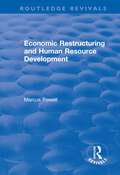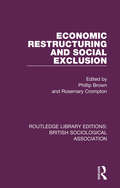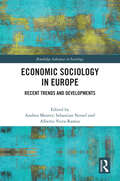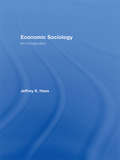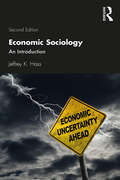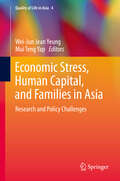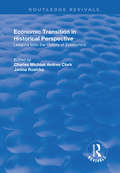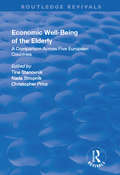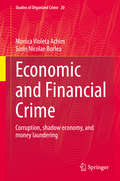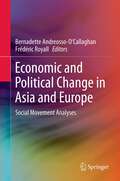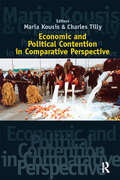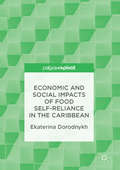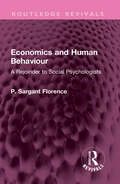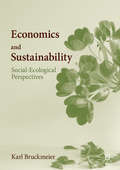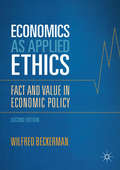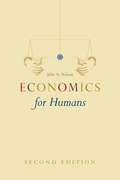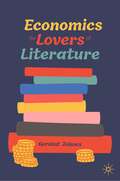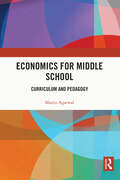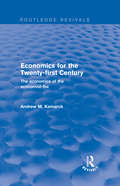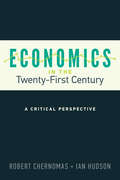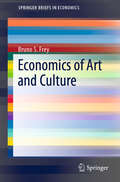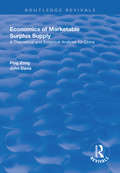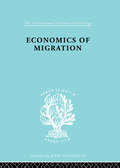- Table View
- List View
Economic Restructuring and Human Resource Development (Routledge Revivals)
by Margaret Black Marcus PowellThis title was first published in 2003. An analysis of education and training issues from the perspective of a planner, this book is the culmination of three years' research stemming from a concern by governments over how they can manage change and what contribution education and training policies play in this.
Economic Restructuring and Social Exclusion: A New Europe? (Routledge Library Editions: British Sociological Association #19)
by Phillip Brown Rosemary CromptonEconomic Restructuring and Social Exclusion provides a timely reminder of persisting inequalities of class, race and gender as a consequence of the changes which have engulfed Europe in less than a decade. The contributors consider key debates including democracy, social justice and citizenship. The book also examines evidence that social and economic polarization is increasing, and the prospect of a conspicuous and growing "underclass" in Europe’s urban centres is fast becoming a reality. This volume will be particularly valuable for undergraduate and postgraduate students in sociology.
Economic Sociology in Europe: Recent Trends and Developments (Routledge Advances in Sociology)
by Andrea Maurer Sebastian Nessel Alberto Veira-RamosThis volume examines the interplay of society and economy against the backdrop of recent crises as well as technological, political and social change in Europe. Covering a range of case studies from different European countries and regions, the contributions analyse the effects of recent challenges such as the Corona Pandemic, the rise of economic nationalism, the functioning of illegal markets, as well as changes in markets and other economic institutions. The book presents the current state of European economic sociological perspectives as well as an overview of the latest theoretical and methodological advancements in the field. It will appeal to students and scholars of economic sociology, economics, political science, political economy, and comparative capitalism research.
Economic Sociology: An Introduction
by Jeff HassThis insightful key resource presents the clearest, most comprehensive and wide ranging account of economic sociology to date. Hass presents a critical and sophisticated yet approachable analysis of economic behaviour and phenomena. He makes the insights, claims, and logic of economic sociology interactive and accessible to students, while exposing the realities of today’s complex economic world and the challenges of studying economies and societies. This introductory text: provides a sophisticated yet approachable analysis of economic behaviour and phenomena explores economic structures and change from a global perspective-by using comparisons and data from the United States, Europe, East Asia, Latin America, and post-socialist countries shows how domestic and international economic forces work over time to shape modern economies takes a critical perspective of both economic sociology and economics to establish useful insights presents historical narratives showing the development of today’s economic structures and institutions addresses important economic issues directly impacting on students’ lives—from the more visible (economic inequality and organizations) to the less visible (international economic trends, public policy, post-socialism). Incorporating illustrations, case studies, a glossary, chapter notes, and a comprehensive bibliography, this student-friendly text also puts forward suggestions for further project work by showing the reader areas that require further investigation.
Economic Sociology: An Introduction
by Jeff HassEconomic Sociology provides the clearest and most comprehensive account of the promises of economic sociology. It shows how economies are more than supply-and-demand curves, individual profit motives, and efficient performance: they are forms of power and structure, grounded in institutions and culture. What is calculated, how, and why? Are profit and efficiency always so central to economic structures and outcomes? What shapes change and reproduction in economic practices and policies? How have classes and states, using power and institutions, created and continue to shape the economic world we live in? This second edition presents a critical and sophisticated yet approachable analysis of economic behavior and phenomena. After describing key concepts and logics of economic sociology and of economics (its eternal cousin and competitor), Hass turns the sociologist’s analytic eye to the heart of economic practices comparing how they work in the United States, Europe, East Asia, Latin America, and post-socialist Russia and China. The volume addresses crucially important economic issues that touch our well-being and justice: the rise and structuring of capitalism; relations between states and economies; economic policies; economies and inequality; and organizations and corporations. Causes and consequences of globalization and the Great Recession are laid out for the reader. With economics and economic sociology placed side-by-side in this journey of how economies operate in the past and present, the reader gets different perspectives on economic reality. Power and culture, institutions and fields, classes and corporations interact on this historical and global stage. Written in a clear and direct style, this textbook will appeal to students and scholars in economic sociology, sociology of work, economics, social policy, political economy and comparative sociology
Economic Stress, Human Capital, and Families in Asia
by Wei-Jun Jean Yeung Mui Teng YapThis book presents recent findings about the consequences and policy implications of economic stress for human capital development and family well-being in Asia. The scope of the chapters goes beyond the impact of current financial crisis to include the effect of economic deprivation families in Asia experience as a result of job loss, low-wage employment, and catastrophic natural calamities. The studies show how macro-level economic stress can filter down through households to affect individuals' economic and socio-psychological well-being. The chapters reveal a wide spectrum of economic stresses experienced by families in Asia that is linked to poor human capital development, emotional distress, health problems, changing fertility patterns, more frequent geographic movement, and less supportive parenting behavior. The elderly, women, children, low-skilled workers are particularly vulnerable. The economic shocks in the past several decades have exposed the vulnerability of the family institution and the weaknesses in this region's social protection system that can lead to detrimental long-term effects on human capital development. This book is relevant for researchers and students in fields such as Family Studies, Globalization, Development, Social Problems, Social Stratification, Social Inequalities, Poverty and Welfare, Education, and Social Policies.
Economic Transition in Historical Perspective: Lessons From The History Of Economics (Routledge Revivals)
by Charles Michael Andres Clark Janina RosickaThis title was first published in 2001. This volume of essays studies the problem of transition in economics from a historical perspective. It uses historical ideas and theories in a modern context to examine economic thought. It aims to show that social and historical context are important when considering economic transitions.
Economic Well-Being of the Elderly: A Comparison Across Five European Countries (Public Policy And Social Welfare Ser.)
by Nada StropnikProviding an in-depth analysis of the economic well-being of the elderly across five European countries - UK, Austria, Hungary, Poland and Slovenia - this book offers an assessment of the performance of national social security systems in terms of income provision for the elderly. Each country analysis strictly adheres to a common methodological framework. This enables meaningful cross-country comparisons, revealing important common developments in the economic well-being of the elderly in all five countries. The authors also examine country specific features and every country chapter is written by an expert in the field who has a thorough knowledge of both the national pension systems and the data sets on which the empirical analyses are based.
Economic and Financial Crime: Corruption, shadow economy, and money laundering (Studies of Organized Crime #20)
by Monica Violeta Achim Sorin Nicolae BorleaThis book deals with the widespread economic and financial crime issues of corruption, the shadow economy and money laundering. It investigates both the theoretical and practical aspects of these crimes, identifying their effects on economic, social and political life. This book presents these causes and effects with a state of the art review and with recent empirical research. It compares the international and transnational aspects of these economic and financial crimes through discussion and critical analysis. This volume will be of interest to researchers and policy makers working to study and prevent economic and financial crime, white collar crime, and organized crime.
Economic and Political Change in Asia and Europe
by Frédéric Royall Bernadette Andreosso-O'CallaghanSince the 1973 publication of Alain Peyrefitte's prophetic When China Awakens, developments in East Asia have outstripped even the wildest predictions. China has undergone the fastest industrialization and urbanization process in history, yet tensions there are rising as some realize how far they have been left behind. This volume explores the applicability of European economic and social models to our analysis of East Asia's and, in particular, China's situation. Though millions of Chinese and other Asian people have been lifted out of poverty, inequality is rising nonetheless, and contemporary Europe and Asia are both witnessing collective action against rampant economic neoliberalism in the former and the exclusion of minorities in the latter. It is difficult to overstate the relevance of this assessment, which seeks answers to some central questions: Can events in Europe serve as a model for those in East Asia? Are there similarities or differences between the two regions? To what extent do political, economic or social systems stimulate or inhibit collective action? How culturally equivalent are the collective actions of marginalized/ disadvantaged people in the two locations, or are events in Europe symptomatic of specific cultural attributes? Comparing and contrasting the research tools and dominant paradigms in the social and economic sciences in East Asia and Europe, as this volume does, throws out some revealing results.
Economic and Political Contention in Comparative Perspective
by Charles Tilly Maria KousisEuropean and American specialists in economic and political processes move beyond earlier debates to look seriously, systematically, and innovatively at social change and protest, with particular attention to the influence of economic change and variation on contentious politics. The essays take up two widely recognized but much contested questions in contentious politics: how threats and opportunities faced by potential participants in joint political action affect the likelihood, character, and consequences of that action; and, how economic change and variation either a) constitute significant political threats and opportunities or b) shape responses to political threats and opportunities. Contributors: Maria Kousis, Charles Tilly, Marc Giugni, Julie Berclaz, Marc Steinberg, Jeffery Broadbent, Klaus Eder, John K. Glenn, Dieter Rucht, Richard Hogan, Maryjane Osa, Cristina Corduneanu-Husi.
Economic and Social Development of Bangladesh
by Yasuyuki Sawada Minhaj Mahmud Naohiro KitanoThis book discusses Bangladesh's economic and social development that may be called a "miracle" since the country has achieved remarkable development progress under several unfavorable situations: weak governance and political instabilities, inequality, risks entailed in rapid urbanization, and exposure to severe disaster risks. The authors examine what led to this successful economic development, and the potential challenges that it presents, aiming to elicit effective policy interventions that can be adapted by other developing countries.
Economic and Social Impacts of Food Self-Reliance in the Caribbean
by Ekaterina DorodnykhThis book provides a multilayered analysis of food import dependency and its impact on food security in the Caribbean region. The study analyses the main impact of trade liberalization in the Caribbean within the WTO framework and main policy mechanisms to support domestic food production in order to reduce food import dependency. Moreover, the author evaluates economic and social benefits of food self-sufficiency as a strategy aimed to improve domestic food production by increased availability of locally produced food products.
Economics and Human Behaviour: A Rejoinder to Social Psychologists (Routledge Revivals)
by Philip Sargant FlorenceFirst published in 1927, Economics and Human Behaviour is a defence of orthodox economics against the attacks of social psychology. The author has explicated on the characteristics and value of both orthodox economics as well as psychology, and then presented psychology’s criticism against orthodox economics. Before concluding with the limitations of both disciplines, this tiny book reinstates the importance of orthodox economics in the gathering and interpretation of facts. Given the predominance of economics over psychology in current times, this book will be an interesting read for anyone keen on imagining the tables turned. It will also appeal to students of economics, history and psychology.
Economics and Sustainability: Social-Ecological Perspectives
by Karl BruckmeierThis textbook provides an overview of economic perspectives on sustainability. It synthesises economic, ecological and interdisciplinary sustainability research and by applying an integrated social-ecological and economic framework, demonstrates how this research can be improved and implemented in practice. Split into three parts, the book begins by introducing a range of topics forming the basis of knowledge needed to understand the varying sustainability discourses in economics, ecology and interdisciplinary sustainability research. Chapters cover the political context of sustainability; the history of sustainability in European environmental discourses dating back to the seventeenth century; as well as various problems and forms of interdisciplinary knowledge integration and synthesis in the sustainability process. Part II reviews the core economic themes relevant to sustainable development including natural resource management, environmental economics and ecological economics. Also highlighted are often neglected issues such as conflicts, disasters and interrelated crises on the way towards sustainability. The chapters in Part III discuss the future of the sustainability process. They argue for the necessity of overhauling the relationship between science and practice; explore failures and the unforeseen difficulties of sustainability transformation; and discuss how to enable a long term sustainability process that reaches into the distant future.An innovative resource for a broad range of interdisciplinary programmes on sustainability. The book will be an invaluable reference for master and PhD students, instructors, researchers and practitioners in sustainability governance.
Economics and consumer behavior
by Angus Deaton John MuellbauerThe idea of duality has proved to be a powerful device in modern work on the economics of consumer behaviour. The authors have used duality to provide an integrated and accessible treatment of this subject. The book focuses on applications of the theory to welfare economics and econometric analysis. The book begins with four chapters that provide a self-contained presentation of the basic theory and its use in applied econometrics. These chapters also include elementary extensions of the theory to labour supply, durable goods, the consumption function, and rationing. The rest of the book is divided into three parts. In the first of these the authors discuss restrictions on choice and aggregation problems. The next part consists of chapters on consumer index numbers; household characteristics, demand, and household welfare comparisons; and social welfare and inequality. The last part extends the coverage of consumer behaviour to include the quality of goods and household production theory, labour supply and human capital theory, the consumption function and intertemporal choice, the demand for durable goods, and choice under uncertainty.
Economics as Applied Ethics
by Wilfred BeckermanThe focus of this textbook is on the link between ethics and economic policy analysis. Basic philosophical concepts are systematically described, followed by conventional welfare economic theory and policy, and applications to some topical economic problems such as income distribution and sustainable development.
Economics for Humans
by Julie A. NelsonAt its core, an economy is about providing goods and services for human well-being. But many economists and critics preach that an economy is something far different: a cold and heartless system that operates outside of human control. In this impassioned and perceptive work, Julie A. Nelson asks a compelling question: given that our economic world is something that we as humans create, aren’t ethics and human relationships—dimensions of a full and rich life—intrinsically part of the picture?Economics for Humans argues against the well-ingrained notion that economics is immune to moral values and distant from human relationships. Here, Nelson locates the impediment to a more considerate economic world in an assumption that is shared by both neoliberals and the political left. Despite their seemingly insurmountable differences, both make use of the metaphor, first proposed by Adam Smith, that the economy is a machine. This pervasive idea, Nelson argues, has blinded us to the qualities that make us work and care for one another—qualities that also make businesses thrive and markets grow. We can wed our interest in money with our justifiable concerns about ethics and social well-being. And we can do so if we recognize that an economy is not a machine, but a living thing in need of attention and careful tending. This second edition has been updated and refined throughout, with expanded discussions of many topics and a new chapter that investigates the apparent conflict between economic well-being and ecological sustainability. Further developing the main points of the first edition, Economics for Humans will continue to both invigorate and inspire readers to reshape the way they view the economy, its possibilities, and their place within it.
Economics for Lovers of Literature
by Geraint JohnesThis book provides an engaging introduction to economics through a literary lens. Drawing on writers such as James Joyce, George Eliot, Edith Wharton, Jane Austen, Charlotte Bronte, and Elizabeth Gaskell, each chapter is framed around a quote from a classic text of English literature that helps tease out a key economic concept and demonstrate its broader relevance. While rigorous, the book is virtually free of technical language and aims to give a concise overview of all the main topics in contemporary economics – from supply and demand, pricing, labour markets, externalities, and game theory, to environmental and behavioural economics, fiscal policy and business cycles, modern approaches to macroeconomics and economic growth.Interweaving literary examples with easy-to-follow explanations and reflective tasks, the book takes an interdisciplinary approach to economics and literature that requires no prior knowledge in either camp, but which illuminates patterns of real-world behaviour observed by novelists and economists alike. This concise and accessible book will be a valuable tool for students embarking on introductory economics courses, economics modules in business studies, and interdisciplinary courses more broadly, as well as the general reader interested in building their knowledge of economics.
Economics for Middle School: Curriculum and Pedagogy
by Manju AgarwalThis book discusses the importance of teaching fundamental economic concepts as part of the middle school social science curriculum in India. It examines the status of economics in Indian schools, the issues faced in teaching it at the middle school level, and emphasizes the need for increasing the economic literacy of students. It offers valuable recommendations to curriculum planners and educators to help them bolster economics education in Indian schools. The author presents an extensive curriculum framework with the intention of developing intellectual and social skills in students. The book also features classroom tested lessons, content guidelines, and a comprehensive teaching plan for grades six, seven, and eight. A crucial contribution to the study of school education in India, this book will be of interest to teachers, students, and researchers of education, economics education, and economics. It will also be useful for policy planners, professional economists, administrators, school boards, and research institutions.
Economics for the Twenty-first Century: The Economics of the Economist-fox
by Andrew M. KamarckThis title was first published in 2001. To be effective, economics must take into consideration the complex nature of human beings and the contextual, institutional, social and historical factors at play. This text is designed to help economists to be economic foxes by increasing the range of economists' tools, drawing on the knowledge and experience of other disciplines, to cope better with the extraordinary complexity of the modern economy. The objective is to provide the same kind of revelation in understanding an economy that an artist possesses in the visual arts. A beginner looking at a still life sees a green bottle, a red apple and a yellow cloth on a table top. An artist, however, can point out to him all the nuances of colour. Following a rapid dissection of the canonical hypotheses of contemporary economic theory, different sectors of the real economy are explored: the corporation; corporate governance; services; the public sector; civil society; professions; social capital; national cultures; and the tropics.
Economics in the Twenty-First Century: A Critical Perspective
by Ian Hudson Robert ChernomasEconomics has always been nicknamed the "dismal science," but today the field seems a little more dismal than usual as governments, social movements, and even students complain that the discipline is failing to make sense of the major economic problems of the day.In Economics in the Twenty-First Century, Robert Chernomas and Ian Hudson demonstrate how today's top young economists continue to lead the field in the wrong direction. The recent winners of the John Bates Clark medal, economics's "baby Nobel," have won that award for studying important issues such as economic development, income inequality, crime, and health. Examining their research, Chernomas and Hudson show that this work focuses on individual choice, ignores the systematic role of power in the economic system, and leads to solutions that are of limited effectiveness at best and harmful at worst.An accessible summary of the latest debates in economics, Economics in the Twenty-First Century takes on what is missing from mainstream economics, why it matters, and how the discipline can better address the key concerns of our era.
Economics of Art and Culture (SpringerBriefs in Economics)
by Bruno S. FreyThis book studies the relationship between the arts and the economy. By applying economic thinking to arts and culture, it analyses markets for art and cultural goods, highlights specific facets of art auctions and discusses determinants of the economic success of artists. The author also sheds new light on various cultural areas, such as the performing and visual arts, festivals, films, museums and cultural heritage. Lastly, the book discusses cultural policies, the role of the state in financing culture, and the relationship between the arts and happiness.
Economics of Marketable Surplus Supply: Theoretical and Empirical Analysis for China (Routledge Revivals)
by John Davis Ping ZongPublished in 1998. Chinese farm households have been at the centre of the rural reform process since the introduction of the Household Responsibility System in the late 1970’s. There can be little doubt that, for decades to come, they will continue to be a focus of interest both in academic and political circles. This is particularly true in relation to their role of grain sector, when we consider the prominent position of grain in China’s political economy. There is also intense global interest in the impact of the reform process on the country’s future grain self-sufficiency and trade. This book is ambitious in both its scope and remit. Its primary focus is the behaviour of the marketable surplus element of farm households’ grain supply since the beginning of the reform period. The early chapters provide very valuable insights into the nature of the rural reform process; it then looks at the impact of the reforms on the structure of rural economy in general and farm households in particular. This part of the book is rich in statistics on the reform period. In the analytical section the emphasis is on the difficult area of household modelling, covering both theoretical and empirical aspects. Despite the data limitations, which the authors acknowledge, these chapters provide very valuable analyses of the grain price changes. In particular, their use of models which capture the interdependencies between grain marketable surplus supply is a genuine contribution. This book should be read by anyone with an interest in the rural reform process in China and will be of particular relevance to students, scholars and the policy community.
Economics of Migration (International Library of Sociology)
by Julius IssacFirst published in 1998. Routledge is an imprint of Taylor & Francis, an informa company.
